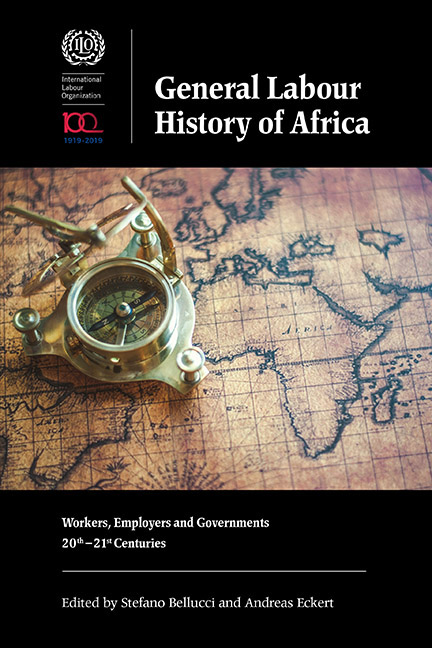Book contents
- Frontmatter
- Contents
- List of Maps and Figures
- List of Tables
- Notes on Contributors
- Foreword
- Acknowledgements
- The ‘Labour Question’ in Africanist Historiography
- Part I Free and Unfree Labour
- Part II Key Sectors
- 4 Agriculture
- 5 Mining
- 6 Industry and Manufacturing
- 7 Transport
- Part III International Dimensions and Mobility
- Part IV Varieties of Work
- Part V Entrepreneurs and Self-Employment
- Part VI The State, Unions and Welfare
- Part VII Conclusions
- Select Bibliography
- Index
7 - Transport
from Part II - Key Sectors
Published online by Cambridge University Press: 21 September 2019
- Frontmatter
- Contents
- List of Maps and Figures
- List of Tables
- Notes on Contributors
- Foreword
- Acknowledgements
- The ‘Labour Question’ in Africanist Historiography
- Part I Free and Unfree Labour
- Part II Key Sectors
- 4 Agriculture
- 5 Mining
- 6 Industry and Manufacturing
- 7 Transport
- Part III International Dimensions and Mobility
- Part IV Varieties of Work
- Part V Entrepreneurs and Self-Employment
- Part VI The State, Unions and Welfare
- Part VII Conclusions
- Select Bibliography
- Index
Summary
In contemporary Africa, the development of transport labour is intrinsically connected to the expansion of the typical, capitalist form of labour relations: free wage labour. Historically, labour power in transport has proven to be particularly prone to be exploited in exchange for wages: the transport worker of twentieth-century Africa, from the porter to the aviation pilot, is usually a wage worker.
In the twentieth century, caravan routes made up of porters or camels began to be used by trucks and cars; additionally, the sailing boats of the Nile and along West African rivers were joined by motorized vessels. In response to the increasing use of motor vehicles and trucks, colonial governments put emphasis on road construction – albeit on a small scale and using fairly rudimentary tools commensurate with that period. The colonial authorities were keen to make headway in the hinterland primarily to extract and transport raw materials to seaports for onward transmission to their European capitals; thus, the driving force for road construction was not to provide a public service for African colonial subjects. Another important transport initiative of the twentieth century was the construction of railways. The African railway network's main lines were completed by the 1930s. Often, mining and the export of agricultural crops were the almost exclusive reasons for the construction of railways. Seaports and paved roads also developed significantly in the twentieth century. Unlike railways, seaports and roads had existed for centuries in Africa. What changed was the introduction of the steam engine, and later the petrol engine, imported from Europe and North America to Africa during the colonial years – especially in the period encompassing the two world wars and the introduction of lorries and cars, which introduced driving as an important type of job. Railways also required new labour and mechanical expertise. Commercial air transport expanded in the second half of the twentieth century. The air transport industry in Africa directly generated an estimated 400,000 jobs in 2012. A good portion of these workers are highly skilled and well paid.
TRANSPORT AND THE ORIGINS OF FREE WAGE LABOUR
The workers who make the transport of goods and people possible are not restricted to the types we usually think of, such as dock workers/ longshoremen, sailors, train drivers or pilots.
- Type
- Chapter
- Information
- General Labour History of AfricaWorkers, Employers and Governments, 20th-21st Centuries, pp. 195 - 220Publisher: Boydell & BrewerPrint publication year: 2019



